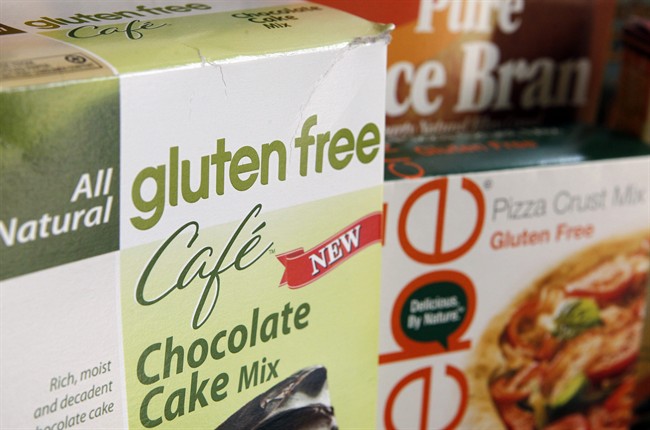If you’re eating gluten-free fare because you’re convinced it’s healthier for you, U.S. researchers are urging you to take a look at their new research.

The gluten-free craze took off in recent years – consumers think they’ll lose weight, improve digestion and feel healthier. But University of Florida scientists say that if you don’t have celiac disease, you could be doing more harm than good by sticking to the fad diet.
Refined gluten-free food, for the most part, isn’t enriched or fortified with essential minerals and vitamins. And keep in mind: those with celiac disease avoid gluten not by choice. They turn to their doctors to help them round out their diets.
READ MORE: Is your gluten intolerance real? Study says gluten insensitivity is fake
Lead researcher Dr. Karla Shelnutt isn’t sure if the everyday consumer adopting the gluten-free diet for personal reasons is doing the same.
“If I’m a college student, and I want to lose weight, and I read on the Internet that a gluten-free diet is the way to go, I may start avoiding products that contain essential nutrients such as those found in cereal grains fortified with folic acid,” Shelnutt said in a university statement.
“The problem is that you have a lot of healthy women who choose a gluten-free diet because they believe it is healthier for them and can help them lose weight and give them healthier skin,” she said.
There are about 300,000 Canadians living with celiac disease, according to Health Canada. It’s a food sensitivity triggered by gluten, causing damage to the small intestine while leaving patients with inflammation and abdominal pain among other symptoms.
- Ontario doctors offer solutions to help address shortage of family physicians
- Capital gains changes are ‘really fair,’ Freeland says, as doctors cry foul
- ‘Dangerous message’: Experts slam anti-sunscreen claims circulating online
- As fake Botox cases prompt alert in U.S., Canada says no new issues reported
Right now, the only way people manage celiac disease is by following a strict gluten-free diet, avoiding wheat, barley and rye.
In the U.S., gluten-free good is a $10.5-billion industry and it’s grown by 44 per cent within the past few years.
READ MORE: Gluten-free tops Canada’s hottest food trends for 2014
For her study, Shelnutt had 97 people eat cookies and chips – all gluten-free. But only half had the “gluten-free” label while the rest were labelled “conventional.”
Participants had to rate each food on a nine-point scale. Even though all of the snacks were gluten-free, one third ranked the ones with the coveted label as being healthier than the conventional snacks.
Fifty-seven per cent of the study’s subjects thought gluten-free diets can help alleviate medical conditions and 35 per cent thought it’d help with digestive health.
But doctors say that’s not always the case.
Some experts go so far as to say they hope the gluten-free fad comes to an end this year. They say that the gluten-free label has a “health halo” meaning people reach for these products thinking they are better options. The products are probably still processed, though. And if they do feel good? They might be eating more whole foods.
READ MORE: Do fad diets followed by celebrities work?
“Gluten-free doesn’t necessarily mean healthy for you. Gluten-free muffins or cake or baked goods – people think they’re good for them, but it’s not, necessarily,” Cleveland Clinic registered dietitian Jennifer Sygo explained.
Gluten is found in grains, such as wheat, barley and rye. Instead, gluten-free diets swap these out for flours made with rice, soy, potatoes or tapioca. Beans, nuts, fresh eggs, meat, fruit and vegetables are also safe bets for those with gluten intolerance.
Some celebrities embraced the gluten-free lifestyle to help them with their gluten insensitivities. Others — like Miley Cyrus — boasted that their switch to a gluten-free diet helped with weight loss.
In a recent study, an Australian doctor cast doubt on self-reported gluten-interolerance.
READ MORE: Canadian researchers developing treatment for celiac disease
Some supporters of the gluten-free diet may say that they feel healthier with better digestion since adopting the diet, but the May 2014 study found that if you aren’t suffering from celiac disease, your intolerance is likely in your head.
In that case, participants were cycled through three diets: high-gluten, low-gluten and a control.
The findings? Participants reported stomach pain and sensitivity even when they weren’t eating gluten. Each diet had patients reporting pain, bloating, nausea, and gas after their baseline treatment.
Shelnutt’s findings were published in the current edition of the Journal of Nutrition Education and Behaviour.
carmen.chai@globalnews.ca
Follow @Carmen_Chai




Comments